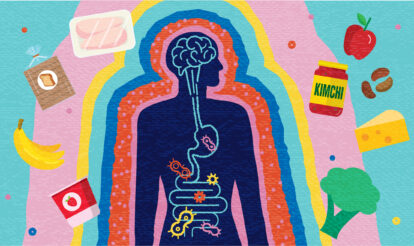
The critical window: children’s gut microbiome in early life
The critical window: children’s gut microbiome in early life

The first three years of a child’s life are an incredible journey. Not just for their developing minds and bodies, but for their lifelong wellbeing.
It’s during this period – referred to by researchers as “the critical window” – that the gut microbiome undergoes significant transformations, largely driven by diet and environmental factors. From pregnancy to birth and the early months of babyhood, certain stimuli all play a part in the shaping of gut microbiota.[1] Research has shown that this period can have lifelong effects on a child’s wellbeing, and can influence their susceptibility to health issues such as allergies, skin disorders, neurological conditions, and even autism.[2],[3]
Let’s take a look at the various factors involved in the development of a child’s gut health, and how – or when – probiotic interventions can be beneficial.
Pregnancy
Research shows that gut microbiome development begins in the womb, influenced by the mother’s diet and health. Maternal health should be kept in mind when looking to help improve gut microbiome in kids.[4]
During pregnancy, delivery, and lactation, a mother’s own microbes and microbial metabolites are shared with her baby. This initial ‘seeding’ depends largely on a mother’s diet and health status, and is now known to be an important determinant of a child’s immune and metabolic development.[5] Evidence suggests that alteration of maternal gut microbiome during pregnancy, breastfeeding, or both can have persistent effects on a child’s own gut microbiota and their adaptive immune function.[6]
Mode of delivery
The way a child enters the world can significantly impact gut microbiome child development, impacting their health not just in the early months but up to the age of seven.[7]
During their passage through the birth canal, a newborn receives valuable probiotic bacteria from the mother. Babies born vaginally receive rapid colonization of Bifidobacterium species after birth. In babies born by cesarean section, however, Bifidobacterium diminishes significantly, increasing the risk of developing gastrointestinal and immune-mediated disorders.[8] These reduced levels of bacteria can also impact a child’s metabolism, immune function, and overall health status.[9]
However, probiotics can help support a healthy gut microbiome in children. Newborns born by C-section and treated with probiotics were found to have beneficial gut microbiota similar to that of vaginally delivered babies, including the crucial Bifidobacterium species.[10] Probiotics given to C-section newborns can have immunomodulatory effects, including a reduced risk of atopic and infectious diseases and increasing the immune vaccination response.[11]
Antibiotics
Antibiotic treatment during early years can significantly disrupt gut microbiome child development. Restoring balance with probiotics and foods that help make the gut microbiome healthy for kids should be a priority. Young children treated with antibiotics are found to be more vulnerable to obesity and inflammatory bowel diseases later in life.[12] Reduced levels of Lactobacillus and Bifidobacteria in children up to three months of age due to antibiotics may also increase the risk of skin conditions and asthma.[13]
A key strategy for how to improve gut microbiome in kids is to incorporate probiotics, which help restore balance and support healthy gut function.
When antibiotics are necessary, probiotics may help support the restoration of healthy bacteria. Probiotics taken after (or during) antibiotic treatment can reduce the effects of the medication on gut microbiota, and help to restore the balance of healthy bacteria while inhibiting opportunistic pathogens.[14] Studies also suggest that using combinations of bacterial strains is most beneficial, as different bacterial species play different roles in restoring gut health and providing protection.[15]
Breastfeeding
Breastmilk is a rich source of beneficial bacteria that plays a vital role in making the gut microbiome healthy for kids by inoculating the gut environment after birth. Probiotic bacteria in breastmilk are shown to promote colonisation of healthy microbes and deter pathogens. The oligosaccharides, antimicrobial factors, and secretory IgA (SIgA) in breastmilk all help to provide resistance against diarrhoea, allergy, and various intestinal illnesses.[16]
Breastfed infants benefit from foods that help the gut microbiome, supporting the development of a more stable gut microbiota that supports immune function.
However, breastfeeding is not feasible for every mother. Recent studies show that probiotic-fortified infant formula can mimic the function of breast milk, helping to optimize microbial composition and overall health of the gut microbiota.[17] Babies fed formula containing Bifidobacterium and Lactobacillus species had fewer episodes of colic, fever, and less use of antibiotics.[18]
Exposure to bacteria – good and bad
While parents are often fearful of ‘germs’, the truth is that a child’s exposure to a wide variety of microbial organisms during early life can be beneficial.[19] Exposure to a variety of microbial organisms is another essential element in gut microbiome child development.
Children who frequently encounter opportunistic bacteria are less likely to develop allergies and autoimmune diseases in adult life. Scientists call this the ‘hygiene hypothesis’, in which exposure to environmental bacteria during early childhood helps to strengthen gut microbiota and overall resistance to pathogens in adult life.[20] Excessive hygiene, on the other hand, can lead to an underdeveloped immune system which may be less prepared to fight infections.[21]
Every family’s situation is unique, and parents often face different health circumstances. Probiotics and dietary support can still offer beneficial ways to promote gut health at different stages.
Research indicates that probiotics may support beneficial bacteria balance in early childhood.
While probiotics and gut health support can be beneficial, maintaining a balanced diet, healthy environment, and working closely with healthcare providers are essential parts of promoting children’s health at every stage.
[1] Pantazi, A. C., Balasa, A. L., Mihai, C. M., Chisnoiu, T., Lupu, V. V., Kassim, M. A. K., Mihai, L., Frecus, C. E., Chirila, S. I., Lupu, A., Andrusca, A., Ionescu, C., Cuzic, V., & Cambrea, S. C. (2023). Development of Gut Microbiota in the First 1000 Days after Birth and Potential Interventions. Nutrients, 15(16), 3647. https://doi.org/10.3390/nu15163647
[2] Borre, Y. E., O’Keeffe, G. W., Clarke, G., Stanton, C., Dinan, T. G., & Cryan, J. F. (2014). Microbiota and neurodevelopmental windows: implications for brain disorders. Trends in molecular medicine, 20(9), 509–518. https://doi.org/10.1016/j.molmed.2014.05.002
[3] Pantazi, A. C., Balasa, A. L., Mihai, C. M., Chisnoiu, T., Lupu, V. V., Kassim, M. A. K., Mihai, L., Frecus, C. E., Chirila, S. I., Lupu, A., Andrusca, A., Ionescu, C., Cuzic, V., & Cambrea, S. C. (2023). Development of Gut Microbiota in the First 1000 Days after Birth and Potential Interventions. Nutrients, 15(16), 3647. https://doi.org/10.3390/nu15163647
[4] Martín-Peláez, S., Cano-Ibáñez, N., Pinto-Gallardo, M., & Amezcua-Prieto, C. (2022). The Impact of Probiotics, Prebiotics, and Synbiotics during Pregnancy or Lactation on the Intestinal Microbiota of Children Born by Cesarean Section: A Systematic Review. Nutrients, 14(2), 341. https://doi.org/10.3390/nu14020341
[5] Zhou, L., & Xiao, X. (2018). The role of gut microbiota in the effects of maternal obesity during pregnancy on offspring metabolism. Bioscience reports, 38(2), BSR20171234. https://doi.org/10.1042/BSR20171234
[6] Nyangahu, D. D., Lennard, K. S., Brown, B. P., Darby, M. G., Wendoh, J. M., Havyarimana, E., Smith, P., Butcher, J., Stintzi, A., Mulder, N., Horsnell, W., & Jaspan, H. B. (2018). Disruption of maternal gut microbiota during gestation alters offspring microbiota and immunity. Microbiome, 6(1), 124. https://doi.org/10.1186/s40168-018-0511-7
[7] Salminen, S., Gibson, G. R., McCartney, A. L., & Isolauri, E. (2004). Influence of mode of delivery on gut microbiota composition in seven year old children. Gut, 53(9), 1388–1389. https://doi.org/10.1136/gut.2004.041640
[8] Giordani, B., Abruzzo, A., Parolin, C., Foschi, C., Laghi, L., Marangoni, A., Luppi, B., & Vitali, B. (2023). Prebiotic Activity of Vaginal Lactobacilli on Bifidobacteria: from Concept to Formulation. Microbiology spectrum, 11(1), e0200922. https://doi.org/10.1128/spectrum.02009-22
[9] Kumbhare, S. V., Patangia, D. V. V., Patil, R. H., Shouche, Y. S., & Patil, N. P. (2019). Factors influencing the gut microbiome in children: from infancy to childhood. Journal of biosciences, 44(2), 49.
[10] Martín-Peláez, S., Cano-Ibáñez, N., Pinto-Gallardo, M., & Amezcua-Prieto, C. (2022). The Impact of Probiotics, Prebiotics, and Synbiotics during Pregnancy or Lactation on the Intestinal Microbiota of Children Born by Cesarean Section: A Systematic Review. Nutrients, 14(2), 341. https://doi.org/10.3390/nu14020341
[11] Kamphorst, K., Carpay, N. C., de Meij, T. G. J., Daams, J. G., van Elburg, R. M., & Vlieger, A. M. (2022). Clinical outcomes following pre-, pro- and synbiotic supplementation after caesarean birth or antibiotic exposure in the first week of life in term born infants: A systematic review of the literature. Frontiers in pediatrics, 10, 974608. https://doi.org/10.3389/fped.2022.974608
[12] Miller, S. A., Wu, R. K. S., & Oremus, M. (2018). The association between antibiotic use in infancy and childhood overweight or obesity: a systematic review and meta-analysis. Obesity reviews : an official journal of the International Association for the Study of Obesity, 19(11), 1463–1475. https://doi.org/10.1111/obr.12717
[13] Lee-Sarwar, K. A., Chen, Y. C., Chen, Y. Y., Kozyrskyj, A. L., Mandhane, P. J., Turvey, S. E., Subbarao, P., Bisgaard, H., Stokholm, J., Chawes, B., Sørensen, S. J., Kelly, R. S., Lasky-Su, J., Zeiger, R. S., O’Connor, G. T., Sandel, M. T., Bacharier, L. B., Beigelman, A., Carey, V. J., Harshfield, B. J., … Litonjua, A. A. (2023). The maternal prenatal and offspring early-life gut microbiome of childhood asthma phenotypes. Allergy, 78(2), 418–428. https://doi.org/10.1111/all.15516
[14] Zou, Z. H., Liu, D., Li, H. D., Zhu, D. P., He, Y., Hou, T., & Yu, J. L. (2018). Prenatal and postnatal antibiotic exposure influences the gut microbiota of preterm infants in neonatal intensive care units. Annals of clinical microbiology and antimicrobials, 17(1), 9. https://doi.org/10.1186/s12941-018-0264-y
[15] Navarro-Tapia, E., Sebastiani, G., Sailer, S., Toledano, L. A., Serra-Delgado, M., García-Algar, Ó., & Andreu-Fernández, V. (2020). Probiotic Supplementation During the Perinatal and Infant Period: Effects on Gut Dysbiosis and Disease. Nutrients, 12(8), 2243. https://doi.org/10.3390/nu12082243
[16] Sarkar, A., Yoo, J. Y., Valeria Ozorio Dutra, S., Morgan, K. H., & Groer, M. (2021). The Association between Early-Life Gut Microbiota and Long-Term Health and Diseases. Journal of clinical medicine, 10(3), 459. https://doi.org/10.3390/jcm10030459
[17] Eor, J. Y., Lee, C. S., Moon, S. H., Cheon, J. Y., Pathiraja, D., Park, B., Shin, M. J., Kim, J. Y., Kim, S., Noh, Y., Kim, Y., Choi, I. G., & Kim, S. H. (2023). Effect of Probiotic-Fortified Infant Formula on Infant Gut Health and Microbiota Modulation. Food science of animal resources, 43(4), 659–673. https://doi.org/10.5851/kosfa.2023.e26
[18] Indrio, F., Gutierrez Castrellon, P., Vandenplas, Y., Cagri Dinleyici, E., Francavilla, R., Mantovani, M. P., Grillo, A., Beghetti, I., Corvaglia, L., & Aceti, A. (2022). Health Effects of Infant Formula Supplemented with Probiotics or Synbiotics in Infants and Toddlers: Systematic Review with Network Meta-Analysis. Nutrients, 14(23), 5175. https://doi.org/10.3390/nu14235175
[19] Marques, T. M., Wall, R., Ross, R. P., Fitzgerald, G. F., Ryan, C. A., & Stanton, C. (2010). Programming infant gut microbiota: influence of dietary and environmental factors. Current opinion in biotechnology, 21(2), 149–156. https://doi.org/10.1016/j.copbio.2010.03.020
[20] Liu A. H. (2015). Revisiting the hygiene hypothesis for allergy and asthma. The Journal of allergy and clinical immunology, 136(4), 860–865. https://doi.org/10.1016/j.jaci.2015.08.012
[21] Strachan D. P. (1989). Hay fever, hygiene, and household size. BMJ (Clinical research ed.), 299(6710), 1259–1260. https://doi.org/10.1136/bmj.299.6710.1259




